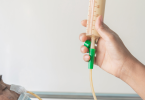While strokes have become relatively common—more than 795,000 people in the United States have a stroke each year, according to the Centers for Disease Control and Prevention—many risk factors for stroke can be managed in partnership with your healthcare provider.
Manage your risk factors
Stroke happens when blood flow to the brain is blocked, causing damage to parts of the brain. As such, risk factors for stroke all have a negative impact on the cardiovascular system. “Stroke is a vascular disease of the brain and its risk factors are fairly similar to the risk factors that people may be more familiar with for heart attack,” said Dr. Jeffrey Switzer, a neurologist at Wellstar MCG Health Medical Center and chair of the department of neurology at the Medical College of Georgia. “The good news is that many of the risks can be avoided or managed through lifestyle and pharmaceutical interventions,” added Dr. Switzer.
Factors that can increase your risk of experiencing a stroke include:
High blood pressure
Hypertension, or elevated blood pressure, increases the risk of a stroke. Stay up to date on your annual physicals to know your blood pressure levels, and if you have hypertension, talk to your provider about managing it. “High blood pressure is one of the most prevalent risk factors that we see, often unknown or known but not treated. People will say that they’ve always lived with high blood pressure. But if it’s not lowered, it will cause serious trouble in the future. So eating more vegetables, more fiber, less meat, less sugar, more physical activity and medication when prescribed are key to managing hypertension and lowering the risk for a stroke,” explained Dr. Dan-Victor Giurgiutiu, a vascular neurologist at Wellstar MCG Health.
High cholesterol
Cholesterol can build up and lead to clotting in the blood, which can cause a stroke if the clot travels and blocks blood flow to the brain. Your primary care provider can help you monitor your cholesterol with a blood test and manage levels with medications or lifestyle changes.
Diabetes
According to the American Diabetes Association, diabetics are two times more likely to experience a stroke. This is because over time, high blood glucose levels can cause increased fatty deposits or clots in blood vessels. Dr. Giurgiutiu says the goal is to avoid developing diabetes all together. “Type II diabetes is largely preventable through healthy diet and exercise to maintain a healthy weight. Obesity, especially carrying extra weight in the abdominal area, leads to more dysfunction in the body—more diabetes, more high blood pressure and more inflammation.” Talk to your provider about diabetes screenings. If you are diabetic, discuss managing the condition with your provider.
Smoking
Smoking can increase your risk of a stroke, so if you are a smoker, it is beneficial to quit. The smoking cessation clinic at Wellstar MCG Health helps users quit all tobacco-related products, including cigarettes, cigars, hookahs, chewing tobacco and electronic cigarettes/vaping.
Atrial fibrillation
Atrial fibrillation, a heart arrythmia, can cause clots that then travel to the brain, leading to a stroke. Because the symptoms are not always noticeable, patients often find out they have the disorder after they experience a stroke. “Having a stroke sharply increases the chance of experiencing another stroke. If patients are found to have atrial fibrillation when they present for a stroke, they are put on blood thinners. It is crucially important that they take the blood thinners as prescribed. With AFib you may feel perfectly fine but the consequences of missing a dose here or there are so much more significant than the consequences of even missing your blood pressure medicine,” said Dr. Switzer. If you have atrial fibrillation, partner with your healthcare provider to manage the condition.
Other risk factors
While many of these risk factors can be controlled through medication or lifestyle changes in collaboration with a healthcare provider, other risk factors for stroke can be out of your control. People of any age can experience a stroke, but stroke risk increases with age.
The risk of having a first stroke is nearly twice as high for Black adults as for white adults, and Black adults and Pacific Islander adults have the highest rates of death from stroke, according to the CDC. Hypertension is more common in Black patients, according to Dr. Giurgiutiu. People in lower socioeconomic communities may also experience higher rates of stroke due to limited access to healthcare and nutritious foods, he added.
To help lower stroke rates in our communities, Wellstar MCG Health, Georgia’s first Advanced Comprehensive Stroke Center, has partnered with the HUB Community Center to offer a blood pressure self-management program that teaches participants nutrition, cooking, exercise and the importance of taking medications. They also offer a stroke support group to help patients avoid a repeat stroke.
How to recognize a stroke
Learn the warning signs of a stroke, and if you notice any of these in yourself or someone else, BE FAST and call 911 right away.
Balance
Look for a sudden loss of balance or coordination. This can also appear as a sudden, severe headache or dizziness.
Eyes
Blurred vision, double vision or loss of vision can be signs of a stroke. If you think someone else may be having a stroke, ask if they are having trouble seeing out of one or both eyes.
Face
One side of the face may be feeling numb or appear to be drooping. Ask the person to smile and see if it appears uneven.
Arms
Check for sudden arm weakness or numbness. See if the person can lift both arms without one drifting downward.
Speech
Watch out for slurred speech or difficulty speaking. Ask the person to repeat a simple sentence to find out if they are having trouble talking.
Time
Don’t wait to seek care. If you notice any of these symptoms, call 911 immediately. The more treatment is delayed, the more the brain is damaged.


